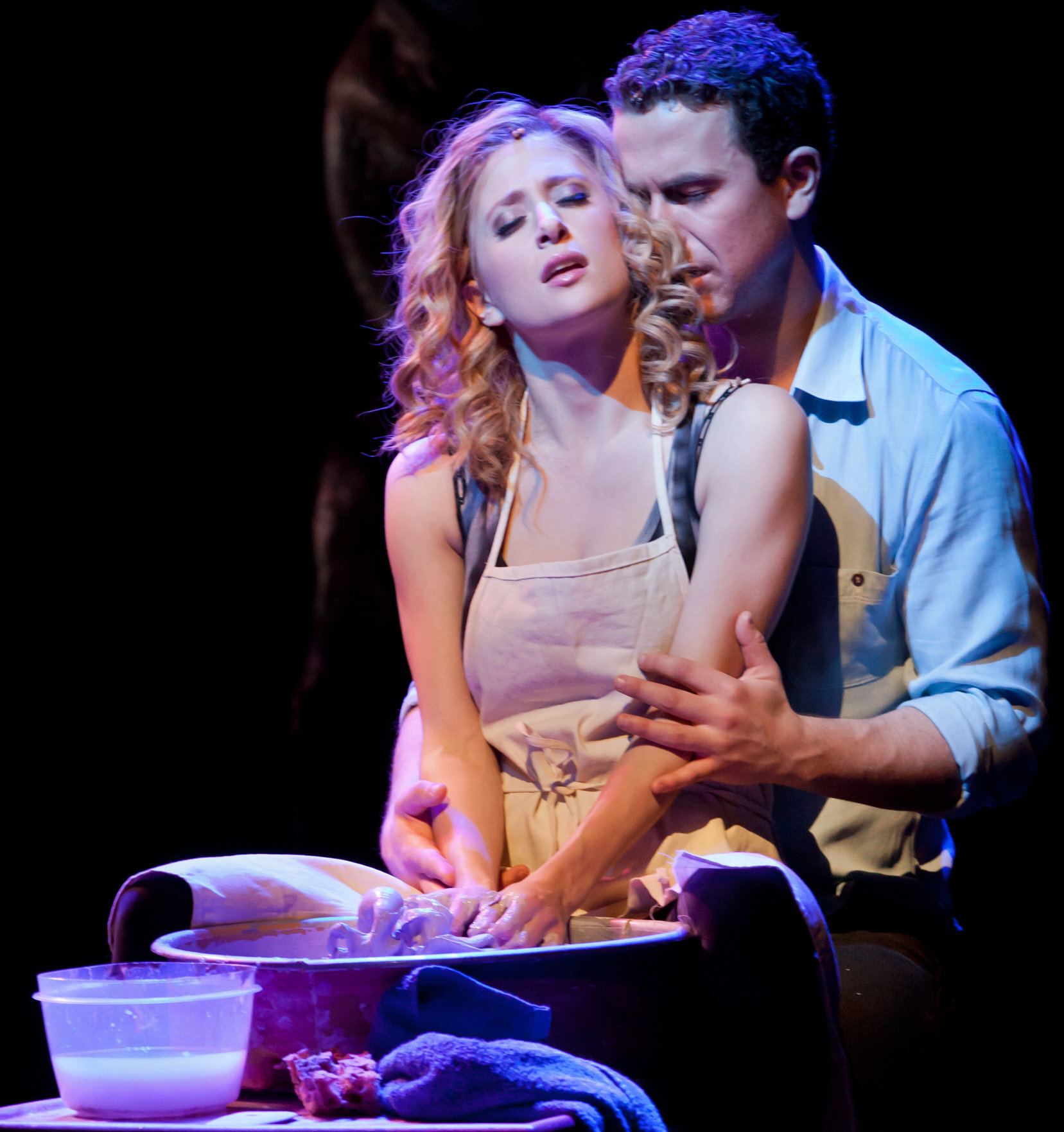Ghost
Lines are blurred at Ghost, the synthetic video game of a musical currently in performances at the Lunt-Fontanne Theater. These are not the lines between life and death, but rather between theater and film.
This production, with with a book and lyrics by Bruce Joel Rubin and music and lyrics by Dave Stewart, is so jam-packed with video montages and special effects that it resembles a form of electronic entertainment more than a theatrical experience. The show even left me with the same emotion I would have after the few times I have actually played a video game — that vague, unsatisfying feeling that I had wasted time on something so unfulfilling.
The oversaturation of Ghost begins before the music even starts. The first thing one sees upon entering the theater is an image of the lovestruck main characters hovering over the curtain. I suppose it is to set the mood for a romantic love story but after being treated to numerous montages of the sights and sounds of New York — mainly, bright, flashing lights and lots of auto-tune — romance was not the first thing on my mind.
The story of Ghost is familiar to most, as the movie was a staple of 1980s chick flicks. Molly and Sam (Cassie Leevy and Richard Fleeshman, respectively) have just moved in together in a large Brooklyn loft. Molly is a sculptor and Sam is a banker. Molly wants Sam to say he loves her, and Sam, for some reason, cannot say the words. (In case we wonder about their relationship up to this point, a montage of photographs of the two fills us in on their past. And just in case that wasn’t enough to make it clear the two are meant to be together, a video montage of the two making love quickly follows.) In a mugging, Sam is shot and killed. But rather than crossing over to the afterlife, he sticks around on Earth, presumably because he loves Molly too much to leave her.
Sam quickly learns of a devious plot behind his death that involves his employee and friend Carl (Bryce Pinkham) and enlists the help of a psychic Oda Mae Brown (Da’Vine Joy Randolph) to assist him in communicating with the living. As the ghost of Sam attempts to bring Carl to justice and give Molly peace of mind, a predictable storyline punctuated with even more predictable songs follows. If it weren’t for the flashing strobe lights, fog machines and ridiculous volume of music, Ghost would be one big snoozefest. Instead, it is one big headache.
Directed by Matthew Warchus, Ghost stars the original principals from London. Leevy, who was wonderful as Shelia in Hair, is wasted in the bland, cardboard cutout role of Molly. Leevy has a lovely, clear singing voice but for some reason is auto-tuned beyond belief. While that technique might be acceptable - or even tolerable on Glee - its use in live theater is puzzling. Fleeshman is handsome and extremely muscular but his performance never registers as passionate enough to actually justify his spirit remaining in limbo out of love for Molly. The two harmonize pleasantly but their duets, namely “Three Little Words” are uninspired and unmelodic.
The only song from Ghost that theatregoes are likely to remember and hum after leaving the theater is “Unchained Melody,” which was rendered immortal by the film’s infamous pottery scene. It is sung in the play, either on the acoustic guitar or along to the radio (and yes, the pottery scene is included onstage). But even Oda, the most over-the-top role onstage, is only given tuneless, forgettable music to sing.
As Oda, Randolph tries to chew the scenery but only succeeds in chomping on it messily. In a role ripe with comedic opportunity, she never registers fully as a character and barely registers as a caricature. She is loud and sassy, but not much else. The majority of the laughs she earned throughout the show could be credited to lines picked straight from the movie script. Pinkham sings well as Carl, but the role gives him little to do. He does not convincingly play a villain, nor does his attraction to Molly seem sincere or even sexual. Michael Balderrama is extremely disappointing as Willie, the criminal for hire behind Sam’s death. And Tyler McGee busts eardrums, but not a move, as the Subway Ghost who demonstrates how supernatural spirits are to blame for the New York Transit subway problems. The large ensemble capably performs Ashley Wallen’s uninspired and unathletic choreography but is given nothing else to do.
Adapting the story of Ghost to the stage requires great special effects, and Paul Kieve accomplishes some extremely impressive moments onstage. When Sam learns how to walk through a door, the audience all breathed a collective sigh of surprise. However notable these achievements are, however, the question of whether they belong onstage remains. In a show with so little to offer musically or dramatically, who cares if the lighting effects dazzle as brightly as Oda’s pink sequined suit in the second act? The dress was more memorable than the song she sang, titled “Outta Here.” I was not moved by the lyrics; instead all I could think was how badly I wanted to leave the theater. I was not entertained, only jealous.

